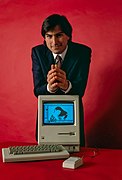
Back بوابة:إنترنت Arabic دەروازە:ئینتەرنێت CKB Portál:Internet Czech Portal:Internet German Portal:Internet Spanish درگاه:اینترنت Persian Portail:Internet French פורטל:אינטרנט HE Պորտալ:Համացանց Armenian Portal:Internet ID
The Internet PortalThe Internet (or internet) is the global system of interconnected computer networks that uses the Internet protocol suite (TCP/IP) to communicate between networks and devices. It is a network of networks that consists of private, public, academic, business, and government networks of local to global scope, linked by a broad array of electronic, wireless, and optical networking technologies. The Internet carries a vast range of information resources and services, such as the interlinked hypertext documents and applications of the World Wide Web (WWW), electronic mail, telephony, and file sharing. The origins of the Internet date back to research that enabled the time-sharing of computer resources and the development of packet switching in the 1960s. The set of rules (communication protocols) to enable internetworking on the Internet arose from research and development commissioned in the 1970s by the Defense Advanced Research Projects Agency (DARPA) of the United States Department of Defense in collaboration with universities and researchers across the United States and in the United Kingdom and France. The ARPANET initially served as a backbone for the interconnection of regional academic and military networks in the United States to enable resource sharing. The funding of the National Science Foundation Network as a new backbone in the 1980s, as well as private funding for other commercial extensions, encouraged worldwide participation in the development of new networking technologies and the merger of many networks using DARPA's Internet protocol suite. The linking of commercial networks and enterprises by the early 1990s, as well as the advent of the World Wide Web, marked the beginning of the transition to the modern Internet, and generated sustained exponential growth as generations of institutional, personal, and mobile computers were connected to the network. Although the Internet was widely used by academia in the 1980s, the subsequent commercialization in the 1990s and beyond incorporated its services and technologies into virtually every aspect of modern life. (Full article...) Selected article
An HTTP cookie is a parcel of textual information sent by a server to a World Wide Web browser and then sent back by the browser each time it accesses that server. HTTP cookies are used for user authentication, user tracking, and maintaining user-specific information such as site preferences and electronic shopping carts. Cookies have been of concern for Internet privacy, since they can be used for tracking the browsing of a user. As a result, they have been subject to legislation in various countries such as the United States, as well as the European Union. Cookies have also been criticised because the identification of users they provide is not always accurate and because they can be used for network attacks. Some alternatives to cookies exist, but have their own drawbacks. On the other hand, cookies have been subject to a number of misconceptions, mostly based on the erroneous notion that they are computer programs. Most modern browsers allow users to decide whether to accept cookies, but rejection makes some Web sites unusable.
Selected picture Lolcats are images combining photographs of animals, most frequently cats, with a subjectively humorous and idiosyncratic caption in broken English referred to as Kitty Pidgin, Kitteh, or lolspeak. The meme originated in the rule 1 and 2 imageboards as the Caturday internet phenomenon. The name "lolcat" is a compound word of "lol" and "cat". The phenomenon is also referred to as cat macros. Lolcats are created for photo sharing imageboards and other internet forums. News
Wikinews Internet portal
WikiProjects
Did you know (auto-generated) -
Selected biography
Sergey Brin (Russian: Сергей Михайлович Брин; born August 21, 1973) is a Russian-born American entrepreneur who co-founded Google with Larry Page. Brin currently holds the position of President of Technology at Google and has a net worth estimated at $18.5 billion as of March 9, 2007, making him the 26th richest person in the world and the 5th richest person in the United States, together with Larry Page. He is also the fourth-youngest billionaire in the world. After graduating from the University of Maryland, Brin received a graduate fellowship from the National Science Foundation, which allowed him to study for his master's degree in computer science at Stanford University. Brin received his master's degree in August 1995 ahead of schedule in the process of his Ph.D. studies. Although he is still enrolled in the Stanford doctoral program, Brin has suspended his Ph.D. studies indefinitely while he is working at Google. Brin met Larry Page while they were both graduate students at Stanford, and they authored a paper together entitled a paper entitled "The Anatomy of a Large-Scale Hypertextual Web Search Engine."
General images -The following are images from various internet-related articles on Wikipedia.
Selected quoteMore Did you know...
Main topics
Featured contentCategoriesRelated portalsThings you can do
Associated WikimediaThe following Wikimedia Foundation sister projects provide more on this subject:
Wikipedia's portals |
© MMXXIII Rich X Search. We shall prevail. All rights reserved. Rich X Search





















































